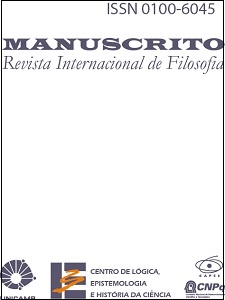Resumo
La crítica contundente de Quine a las nociones intensionales, así como a todo lo superfluo para una ontología de raíz lógica de primer orden, le condujo a rechazar la validez de la noción de semejanza en el ámbito de las ciencias maduras (Quine 1969). El artículo consiste precisamente en responder a esta crítica desde una perspectiva no formalista en la que la ciencia no se reduce a simple teoría, sino que se comprende como un complejo interactivo de diversas prácticas (entre ellas, las teóricas). Mi respuesta a Quine toma como eje fundamental el análisis de la semejanza en una ciencia madura como lo es la química, y presenta un estudio de caso en el ámbito de la química sintética. El objetivo del artí- culo es en tal sentido triple: por un lado, critico la concepción reductivista quineana de la ciencia; por otro, reclamo la importancia de la semejanza en química; y, por último, reivindico lo que denomino pragmatismo experimental, un modo de análisis de la tecnociencia que tiene en cuenta la práctica real de ésta y la interacción teoría-experimento-prácticas científicas desde una perspectiva naturalista. El título incluye el verbo “desquinear”, inexistente en español, en clara referencia a mi negativa de aceptar el análisis de Quine.
Quine's strong criticism of intensional notions as well as of everything that is superfluous for an ontology based on first order logic led him to deny the legitimacy of the notion of similarity in the realm of the mature sciences (Quine 1969). In this paper I try to refute Quine's view by adopting a non-formalistic perspective, i.e., a perspective in which science is not simply reduced to a theory, but is rather seen as an interative complex of several different forms of scientific practices (the theoretical one among them). My reply to Quine has as main pillar the analysis of the notion of similarity in a mature science like chemistry, and is based on a study of a concrete case in the realm of synthetic chemistry. The aim of this paper is, therefore, threefold: first, I shall criticize Quine's reductivism regarding science; second, I shall defend the centrality of the notion of similarity in chemistry; finally, I shall defend what I call experimental pragmatism, i.e., a specific way of analysing technological sciences that takes into account both the actual scientific practice and the interaction between theory, experiment and practices from a naturalistic point of view. The title contains the verb "de-quining", which does not actually exist in Spanish, but clearly refers to my rejection of Quine's analysis.
Referências
BAIRD, D. Thing Knowledge. Berkeley: University of California Press, 2004.
BOYD, R., GASPER, P., TROUT, J.D. (eds). The Philosophy of Science.
Cambridge, MA: The MIT Press, 1993.
BRANDOM, R. B. (ed). Rorty and His Critics. Malden, MA: Blackwell, 2000.
BROWN, T. L., LeMAY, E. Chemistry: The Central Science. New Jersey:
Prentice-Hall, 1977.
BUCCIARELLI, L. L. Engineering Philosophy, Delft: Delft University Press, 2003.
CARBÓ-DORCA, R. (ed). Molecular Similarity and Reactivity: From Quantum Chemical to Phenomenological Approaches. Dordrecht: Kluwer, 1995.
CARBÓ-DORCA, R., CALABUIG, B. “Quantum Similarity Measures, Molecular Cloud Description and Structure-Properties Relationships”. Journal of Chemical Informational Computation, 32, pp. 16-19, 1992.
CARNAP, R.. The Logical Structure of the World. Pseudoproblems in hilosophy. Berkeley: University of California Press, 1928. Traducido por Rolf A. George, 1967.
———. Logical Foundations of Probability. Chicago: The University of Chicago Press, 1950.
CUTCLIFFE, S. H. Ideas, Machines, and Values: An Introduction to Science, Technology, and Society Studies. Lanham, MY: Rowman & Littlefield, 2000.
DENNETT, D. C. “Quining Qualia”. In: A. I. GOLDMAN (ed.) (1993), pp. 381-414.
———. “The Case for Rorts”. In: R. B. BRANDOM (ed.) (2001), pp. 91-101.
GOLDMAN, A. I. (ed). Readings in Philosophy and Cognitive Science. Cambridge, MA: The MIT Press, 1993.
GOODMAN, N. The Structure of Appearance. Dordrecht: Reidel, 1951.
Reedición de 1977.
———. Fact, Fiction, and Forecast, Cambridge, MA: Harvard University
Press, 1954.
HACKING, I. “Experimentation and Scientific Realism”. In: R. BOYD,
P. GASPER, J. D. TROUT (eds.) (1993), pp. 247-260.
———. The Social Construction of What? Cambridge, MA: Harvard University Press, 1999.
HIRSCH, E. Dividing Reality. Oxford: Oxford University Press, 1993.
LAKOFF, G., JOHNSON, M. Philosophy in the Flesh: The Embodied Mind and Its Challenge to Western Thought. New York: Basic Books, 1999.
LAWSON, A.J. “Organic Reaction Similarity in Information Processing”.
Journal of Chemical Information and Computer Sciences 32, pp. 365- 367, 1992.
MITCHAM, C., SHANNON DUVALL, R. Engineer’s Toolkit: Engineering Ethics. Upper Saddle River, NJ: Prentice Hall, 2000.
MONEV, V. “Introduction to Similarity Searching in Chemistry”. MatchCommunications in Mathematical and in Computer Chemistry, 51, pp. 7-38, 2004.
PONEC, R., STAND, M. “Similarity ideas in the Theory of Pericyclic
Reactivity”. Journal of Chemistry and Computer Sciences, 32, pp. 64-72,
QUINE, W. v. O. Word and Object. Cambridge, MA: The M.I.T. Press, 1960.
———. 1969. “Natural Kinds”. In: QUINE, W. v.O. (1969), pp. 114-138.
———. Ontological Relativity and Other Essays. New York: Columbia University Press, 1969.
———. Pursuit of Truth. Cambridge, MA.: Harvard University Press, 1990.
ROUSE, J. How Scientific Practices Matter: Reclaiming Philosophical Naturalism. Chicago: The University of Chicago Press, 2002.
SIGGIA, S., HANNA, J. G. 1949. Quantitative Organic Analysis via Functional Groups. New York: John Wiley and Sons, 1949. Reedición de

